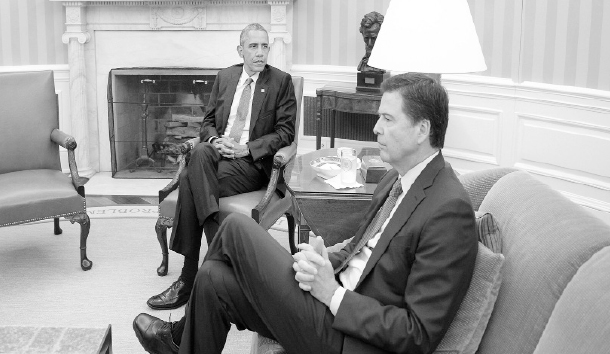In the final weeks of the 2016 U.S. presidential campaign, as our modern-day Madame Defarge’s poll numbers declined slowly but steadily in rhythm to the drip-drip-drip of purloined emails by WikiLeaks, the Clinton campaign settled on a strategy and clung to it for dear life. No one from the campaign would confirm or deny the authenticity of any of the emails, even though the refusal to deny was, of course, an implicit confirmation. Instead, from the top of the ticket on down, every question about the latest embarrassing revelation from the treasure trove of John Podesta’s electronic musings was met with a deflection: We do not comment on “hacks” (another implicit confirmation); ask Donald Trump, instead, to call off Vladimir Putin (the hat trick of confirmations, even though the evidence that Russia, as opposed to individual Russians, had anything to do with the theft of the emails, much less with their release, was circumstantial at best).
Then, 11 days before the election, Podesta’s golden nuggets were pulled out of the fire—by, of all people, Anthony Weiner, whose pathological need to bless women with pictures of Li’l Anthony finally sank him for good, when the latest “woman” turned out to be a 15-year-old girl. What was tawdry and banal before had turned into a potential federal crime, and the FBI seized every electronic device that might possibly have transmitted a Weiner pic. And on a (ahem) laptop, owned by Weiner but apparently used at least once by his now-estranged wife and Clinton’s longtime aide, Huma Abedin, the G-men discovered as many as 650,000 emails—including several thousand sent to or from Hillary’s illicit email server.
FBI Director James Comey, deliberately left in the dark for weeks by the agents in charge of Weinerfest, informed Congress of the new development in the supposedly dormant Servergate, and suddenly Donald Trump had a new best friend. But it was Podesta who should have been thanking Comey rather than (as he did) condemning him, because Comey’s letter to Congress completely overshadowed the revelation, the very next day, that J-Pod’s email had not, in fact, been hacked. Rather, Hillary Clinton’s campaign chair—a former counselor to President Barack Obama and former White House chief of staff under Bill Clinton—had voluntarily handed over the keys to his electronic kingdom.
In March 2016, Podesta had received a “phishing” email—a form of social engineering created to take advantage of people whose understanding of modern technology is tenuous at best. The message, designed to appear to be from Google, informed Podesta that he had to change his Gmail password immediately. To make a long story short, he did just that—by clicking on a link in the email that directed him not to Google’s servers, but to a server run by a third party, who had unlimited access to Podesta’s email from that moment on.
Calling this a “hack” is like saying that your Facebook account was “hacked” by your smartass son when, having noticed that you were still logged into Facebook on the computer that your family shares, he posted under your name “JOHNNY IS THE BEST SON EVAH. PEPE RULEZ!”
Podesta’s foolishness is on par with Huma Abedin’s idiotic decision to log into Hillary’s private email server on a laptop normally used to serve up a heaping helping of her husband’s privates. Or the inability of Hillary and her closest advisors truly to cover their tracks when the existence of her illegal server was discovered.
Or, for that matter, the credulousness of those who could possibly believe, in the face of Podesta’s and Abedin’s and Clinton’s manifest technological incompetence, that the Clinton campaign could manipulate computerized voting machines on anywhere near the scale required to steal an election. (Note: I did not write “manipulate computerized voting machines and not get caught” but “manipulate,” period.)
Next time you’re tempted to believe an elaborate conspiracy theory, remember the story of Johnny’s phishing trip and the password that got away. In the digital age, pulling off even the simplest conspiracy requires more intelligence than anyone in politics today could ever muster.

Leave a Reply